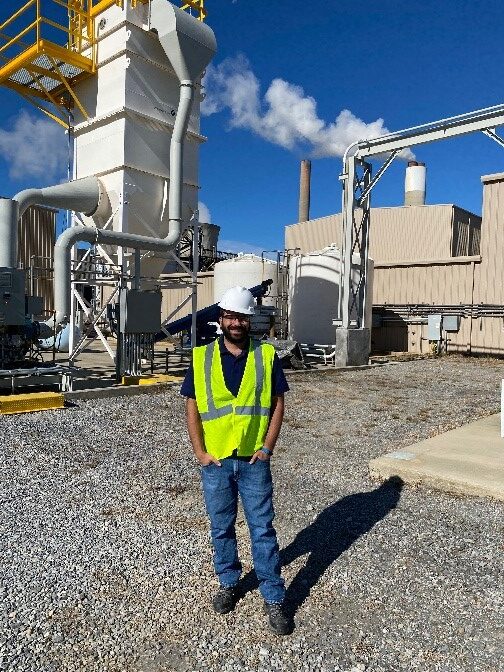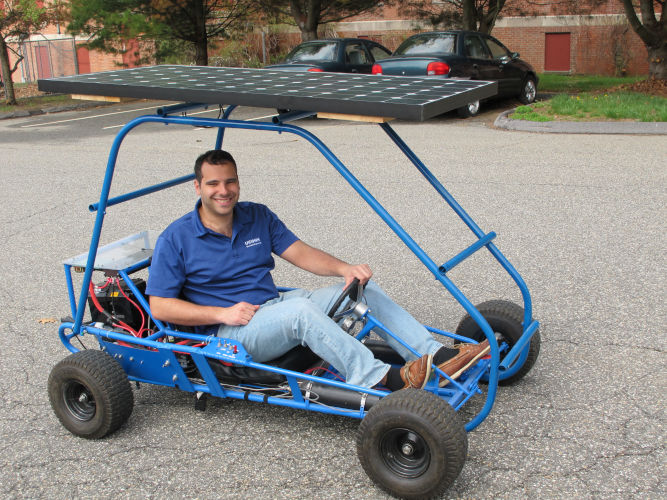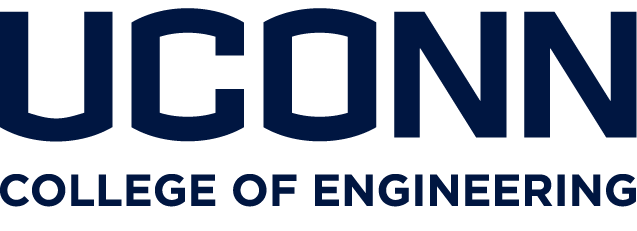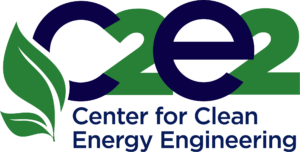Alumni Spotlight: UConn and Beyond – David Gamliel’s Research in Clean Energy
By Ben Donohue & Olivia Ortegon
We sat down with UConn alumnus Dr. David Gamliel, to learn more about his career post-graduation, as well as gain some insight into how his experiences at UConn prepared him for the workforce.

Dr. Gamliel on-site at a power plant in Georgia
Dr. Gamliel went to University of Massachusetts Amherst for his Bachelor’s degree and graduated from UConn in 2018 with his Ph.D., both in Chemical Engineering. He now works as a Principal Research Scientist and Principal Investigator at Physical Sciences Inc. (PSI) in Andover, Massachusetts. In this capacity he leads a team that performs research and development for government agencies like the Department of Energy and Department of Defense. Dr. Gamliel works on cutting edge projects such as atmospheric water extraction, recovery of rare earth elements from coal ash, and creating new firefighter gear decontamination technology.
But before he began working for PSI, Dr. Gamliel gained experience at our very own Center for Clean Energy Engineering (C2E2). Through his undergraduate work, he knew that he wanted to work with energy. As part of his undergraduate career, he completed a Research Experience for Undergraduates (REU) program at the University of South Carolina developing fuel cell technology. After applying to nearly 15 competitive graduate schools, he met Professor Julia Valla, who taught him about the importance of clean fuels and transitioning to a green economy. He was sold. During his time at C2E2, Professor Valla pushed him to be his best, and he published eight first author papers and gained what he says is one of the most valuable experiences of his life.
Dr. Gamliel provided more insight into how C2E2 prepared him for life after graduation. C2E2 colleagues helped him learn how to set up advanced reactors, safely work in lab, and perform complex analyses. He even uses many of the same state of the art laboratory equipment in his job today that he used during his time at UConn. “My experience at C2E2 taught me how to formulate a plan, execute that plan, and solve problems independently” Dr. Gamliel said. He stated that working at C2E2 was the best opportunity he could have had to find a job, and that Dr. the connections he made at UConn have helped him expand his career.
Perhaps the most notable story of how UConn helped Dr. Gamliel’s career starts from when he was still an undergraduate at UMass Amherst. He needed help identifying a catalyst for a project and it was through a poster session at a catalyst society meeting hosted at UConn in 2016 that he met a professor who introduced him to several connections and to the world of networking. Through these connections, Dr. Gamliel was able to gain the knowledge he needed to design the exact material for the catalyst. This became the pivotal point to the start of a successful career. So his advice to all students is “always be nice to people and treat them with respect — you may never know when they will help you later down the road.” His grandfather always said “you see the same faces on the way up as you do on the way down.”
When speaking with his PhD advisor, Professor Julia Valla, she had this to say “David was my very first graduate student, when I started at UConn in 2013 as an Assistant Professor. He helped me build my research lab and group from scratch. Together we survived failures and rejections, but we also celebrated major breakthroughs and achievements. It is amazing how great of an impact a passionate and dedicated student has on the career trajectory of a professor. David was one of those students.”
We asked Dr. Gamliel for any additional advice for undergraduate and graduate students in engineering, and he told us this: “To undergraduate students, pay attention to academics, remain disciplined, and try to get hands-on experience in a lab during your undergraduate years.” He went onto to say you should also do extracurricular activities that do not revolve around academics, and have fun with it. Learning and experiencing new things is the most important thing, since these are your college years, and you will never have another experience quite like it. To graduate students, Dr. Gamliel said this: “Although it will be difficult, it is important to work as hard as you can and keep pushing yourself. It will be worth it in the end.”

David Gamliel: It was not only the research work that made the experience at UConn enjoyable but the lasting friendships and an occasionally drive in the fuel cell/solar powered go-kart that made it fun.

